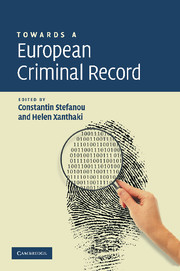Book contents
- Frontmatter
- Contents
- List of contributors
- Preface and acknowledgements
- 1 Introduction: How did the idea of a European Criminal Record come about?
- PART I
- PART II
- PART III
- 16 Databases in the area of freedom, security and justice: Lessons for the centralisation of records and their maximum exchange
- 17 A European criminal records database: An integrated model
- 18 The European Criminal Record: Feasible or folly?
- 19 Conclusions
- Index
16 - Databases in the area of freedom, security and justice: Lessons for the centralisation of records and their maximum exchange
Published online by Cambridge University Press: 13 July 2009
- Frontmatter
- Contents
- List of contributors
- Preface and acknowledgements
- 1 Introduction: How did the idea of a European Criminal Record come about?
- PART I
- PART II
- PART III
- 16 Databases in the area of freedom, security and justice: Lessons for the centralisation of records and their maximum exchange
- 17 A European criminal records database: An integrated model
- 18 The European Criminal Record: Feasible or folly?
- 19 Conclusions
- Index
Summary
Introduction
A key element in the development of EU action in Justice and Home Affairs in recent years has been the creation of legal and technical mechanisms aiming to facilitate the collection, exchange and analysis of personal data. Steps in this direction have taken the form of initiatives aiming both at eliminating obstacles to the exchange of personal data between national authorities and at creating EU-wide structures and databases.
The emphasis on developing EU-wide databases can be witnessed in both the immigration and asylum field (with the establishment of the EURODAC and Schengen Information System (SIS) databases and proposals to establish a Visa Information System (VIS) in the pipeline) and the criminal law/policing field (the Europol database and part of the SIS database being prime examples). Political reactions to terrorist attacks this decade have led to calls for increasingly linking these databases (notwithstanding their different purpose) and increasing their ‘interoperability’ – a strategy clearly visible in the 2004 Hague Programme, a five-year renewal of the EU Justice and Home Affairs strategy. The Hague Programme also calls for the further facilitation of bilateral information exchanges in the police field under the so-called ‘principle of availability’ and for the ‘deepening’ of surveillance by the use of biometrics in the various databases.
- Type
- Chapter
- Information
- Towards a European Criminal Record , pp. 311 - 335Publisher: Cambridge University PressPrint publication year: 2008



